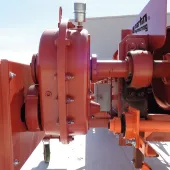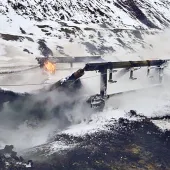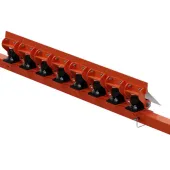EAC certification for Martin Engineering

Company’s conveyor products and material flow aids gain Eurasian Conformity Mark
MARTIN Engineering have gained the EAC Mark of Conformity (aka Eurasian Conformity Mark) for the export of conveyor products and material flow aids, including the company’s full line of impact cradles, belt cleaners, sealing systems, air cannons and sonic horns.
The certification allows the Martin Engineering business units in Germany and Russia to offer the company’s extensive product family to the Customs Union (Russia, Belarus and Kazakhstan) and assures that the equipment is compliant with the EAC’s strict safety and quality standards.
Martin Engineering say this will provide companies in the region with safe and efficient components for improving productivity, controlling fugitive material and clearing accumulation in chutes, silos, kilns and ductwork in a variety of material handling applications such as coal, cement, aggregate and fly ash.
The EAC approval is in accordance with the February 2013 agreement between the member states of the Customs Union that unified certification requirements for machinery and equipment.
According to Russian Division branch manager Oleg Meister, the EAC Mark of Conformity is essential in order to sell and install bulk material handling components in the three member countries. ‘It will be instrumental in assuring ready availability and reasonable lead times,’ he said.
Martin Engineering products previously achieved TR CU (formerly GOST) certification (technical standards for products marketed in the three countries, similar to UL in the US or CE in Europe).
‘Throughout the region, companies are seeking more efficient, safe and profitable ways to run their operations,’ said Mr Meister. ‘Technical advances that improve productivity and reduce risks have been of particular interest.’
Reducing workplace risk is a focus of the EAC Mark of Conformity, assuring the ‘safety of machinery and equipment’, particularly when ‘used in an explosive atmosphere’, such as the many types of cramped spaces filled with volatile dust found in bulk handling systems.
Preventing clogs and piling by keeping material flowing is a key to safe operation and to avoiding the need for workers to enter chutes to perform unpleasant and potentially dangerous maintenance.
‘Effective flow systems are essential to the work of trying to improve the operations of bulk material handling,’ Mr Meister concluded. ‘This certification allows us to offer more complete and versatile solutions that could help make systems across the region safer, while at the same time reducing operating costs.’









